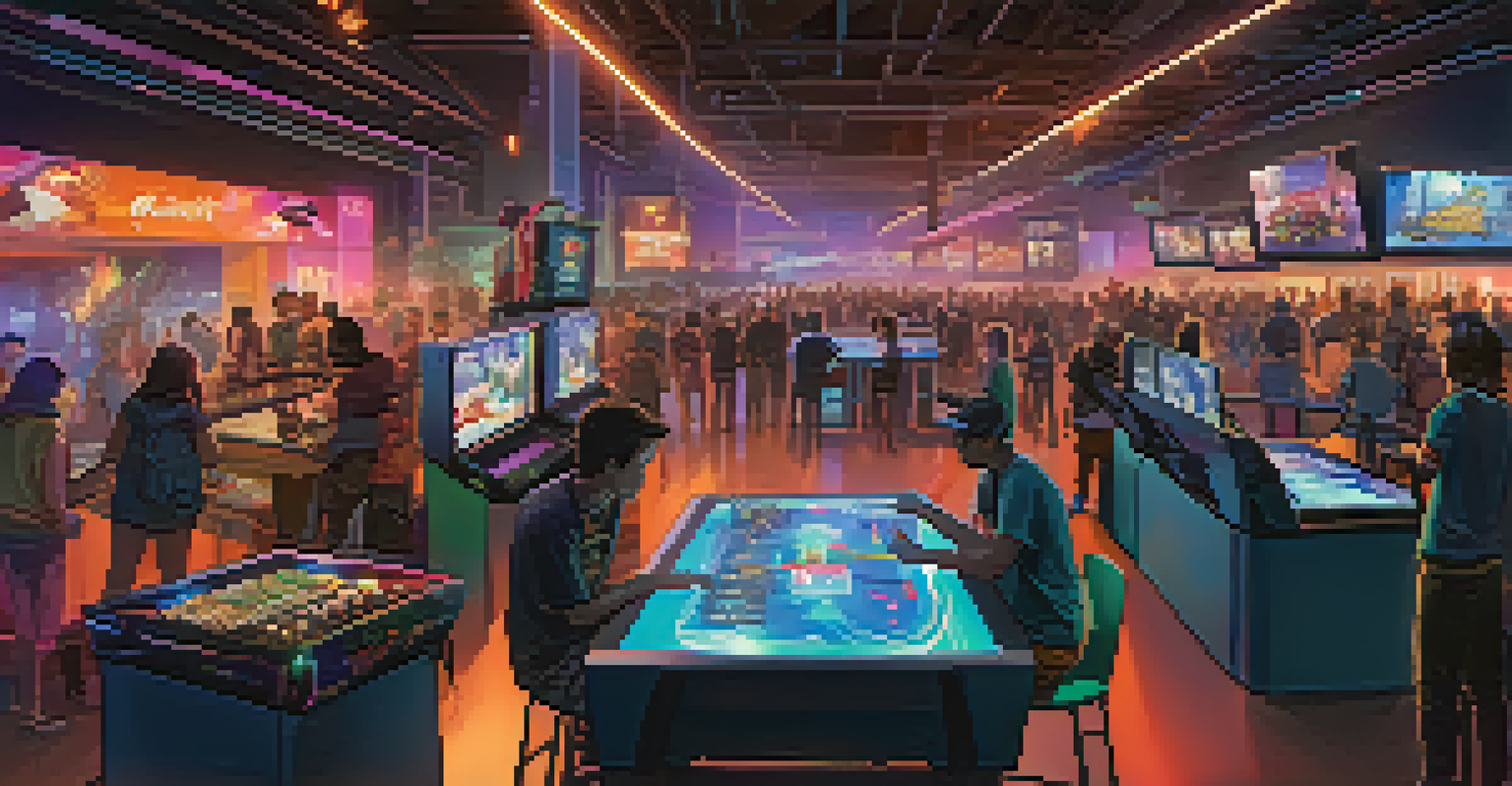Gaming and Mental Health: Benefits and Potential Risks

Understanding Gaming's Popularity Among All Ages
Gaming has surged in popularity, capturing the attention of millions. From children to adults, people are drawn to the immersive worlds and social interactions that video games offer. This widespread appeal raises questions about how gaming influences mental health, both positively and negatively.
Video games are a great way to relieve stress and escape from the pressures of daily life.
Many gamers find solace in playing, using it as a way to unwind after a long day. The colorful graphics and engaging storylines can serve as a welcome escape, providing a mental break from daily stresses. In this way, gaming can act as a form of therapy, allowing players to recharge and relax.
Additionally, the rise of online gaming communities fosters social connections that can combat feelings of loneliness. Gamers often form lasting friendships, creating a sense of belonging that is crucial for mental well-being. Understanding these dynamics is key to appreciating the full impact of gaming on mental health.
The Positive Effects of Gaming on Mental Health
Research suggests that gaming can provide various mental health benefits. For instance, many games encourage problem-solving skills, which can enhance cognitive functions. This aspect is especially beneficial in fast-paced games where players must think quickly and strategize effectively.

Moreover, gaming can improve mood and reduce anxiety for some individuals. Engaging in a fun and challenging game can release dopamine, the 'feel-good' neurotransmitter, which can lead to feelings of joy and accomplishment. This boost can be particularly helpful for those struggling with mental health issues.
Gaming Offers Mental Health Benefits
Video games can enhance cognitive skills, improve mood, and foster resilience through engaging and challenging gameplay.
Another positive outcome is the development of resilience and perseverance through challenges faced in games. Players often encounter setbacks, but overcoming these obstacles can translate to real-life scenarios, helping them build coping skills and a stronger mindset.
Social Interaction and Community Building in Gaming
One of the most compelling aspects of gaming is its ability to foster social interaction. Multiplayer games allow players to connect with others from around the world, forming friendships and support networks. These interactions can provide emotional support that is vital for mental health.
Gaming is not just a hobby; it's a way to connect, share experiences, and create bonds with others.
Gaming communities often create spaces for people to share experiences and advice, which can be particularly beneficial during tough times. The shared interest in gaming can serve as a foundation for deeper connections, helping individuals feel understood and valued.
Furthermore, participating in team-based games can enhance communication skills and teamwork. These skills are not only essential in games but also applicable in everyday life, promoting overall well-being and social competence.
Potential Risks of Excessive Gaming on Mental Health
While gaming can have its benefits, excessive gaming poses significant risks to mental health. Spending too much time in front of a screen can lead to isolation, as players may neglect real-world relationships and responsibilities. This disconnect can ultimately exacerbate feelings of loneliness and depression.
Additionally, the addictive nature of some games can lead to compulsive behavior. Players may find themselves prioritizing gaming over essential activities, such as sleep, work, or socializing. This imbalance can create a cycle of neglecting one's health and well-being.
Community Builds Connections
Multiplayer games create social networks that provide emotional support and help combat feelings of loneliness.
Moreover, excessive gaming can contribute to heightened levels of anxiety and stress. When players feel pressure to perform well or achieve high scores, it can lead to frustration and disappointment, negatively impacting their mental state.
Balancing Gaming with Real Life: Finding Harmony
Finding a balance between gaming and real-life responsibilities is crucial for maintaining mental health. Setting time limits can help ensure that gaming remains a healthy pastime rather than a compulsive activity. By allocating specific gaming hours, players can enjoy their hobby without it interfering with other aspects of life.
Incorporating breaks during gaming sessions can also enhance the experience. Stepping away for physical activity or social interactions can rejuvenate the mind and prevent burnout. This practice encourages a healthier relationship with gaming.
Ultimately, being mindful of one's gaming habits and recognizing when they become problematic is essential. Open conversations about gaming with friends or family can provide valuable insights and support for maintaining a balanced lifestyle.
The Role of Game Design in Mental Health Outcomes
The design of a game significantly impacts its effects on mental health. Games that encourage positive reinforcement and cooperative play tend to promote a healthier gaming experience. Developers are increasingly aware of these dynamics and are creating content that fosters well-being.
Additionally, games that include story-driven elements can provide players with a sense of purpose and involvement. When players feel invested in a narrative, they are more likely to experience emotional engagement, which can be therapeutic.
Excessive Gaming Can Be Harmful
Spending too much time gaming can lead to isolation, neglect of responsibilities, and increased anxiety.
Furthermore, the accessibility of games designed for relaxation and mindfulness can be beneficial. Titles that focus on calming mechanics invite players to experience tranquility, offering a counterbalance to the intensity often found in competitive gaming.
Final Thoughts: Embracing the Balance of Gaming Benefits
In conclusion, gaming can serve as both a powerful tool for enhancing mental health and a potential risk factor. The key lies in moderation and awareness of one's gaming habits. By embracing the positives and acknowledging the negatives, players can navigate their gaming experiences in a healthy way.
It's essential to recognize that gaming is just one aspect of life. Maintaining a well-rounded lifestyle that includes physical activity, social interactions, and offline hobbies can enhance overall mental well-being. Gamers should strive to integrate their passion for gaming with other fulfilling activities.

Ultimately, by understanding the complexities of gaming and mental health, players can create a balanced relationship with their favorite pastime. This balance can lead to a more enriching and enjoyable gaming experience.